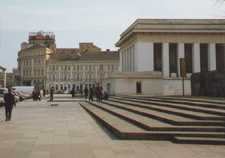 |
Vol 1, No 21
15 November 1999 |
|
|
 C I T I E S:
C I T I E S:
Saving Sofia Paul Csagoly In 1937, Bulgaria's nature-admiring and mountain-climbing Tsar, Boris III, ensured that Sofia, then a capital city with over 280,000 residents, would be graced with large gardens and parks. These would also be directly linked in continuous green corridors to beautiful Mount Vitosha towering nearby. More than 60 years later, Boris Park remains a lush green sanctuary in the centre of the capital, now home to some 1.2 million citizens. "Sofia is greener than most big European cities," says Luchezar Toshev, chair of the Bulgarian parliamentary committee on the environment. With some 2,810 green zones, over 85 per cent of Sofia's citizens are within a 15-minute walk from urban greenspace, says the European Environment Agency (EEA). Parks make way for petrol However, Sofia's green claim to fame, like Bulgaria's pristine mountains, is threatened, say local environmental groups. Since 1990, parks are slowly being destroyed to open up space for new cafes and other commercial developments. No strict development regulations exist to protect the parks, and the city uses the money from the sale of the lands to help fill its coffers, say the environmentalists. "Some developments are illegal," says Petko Tzvetkov of the non-governmental organisation (NGO) Green Balkans. A recent major point of contention was the construction of a new Hilton Hotel that blocks a direct green link from the city to Mount Vitosha. "There were no public hearings, no environmental impact assessments, and we only heard about it after the plans were made," says Tzvetkov. "The Hilton is a good example that Sofia's parks are slowly being eliminated," says Petar Iankov, director of the Bulgarian Society for the Protection of Birds. He adds that a park next to his home disappeared overnight without any public notice. "It will be developed, probably for a petrol station." One project trying to make a green difference is Let's Plant a Green Sofia for Us and Our Children, implemented by three local NGOs in conjunction with Bulgaria's Environment Ministry and the Greater Municipality of Sofia. The project includes planting tree s, educational activities and public meetings and has already managed to create favourable conditions for new trees. Toshev and Sofia mayor Stefan Sofianski believe that waste management is the city's biggest problem. Dimitur Vassilev from the Sofia-based ECO-CLUB 2000 adds that the city's waste is thrown nearby into the recently closed sand-mine pits of Dolny Bogrov, now filled with water, causing the leaking of pollutants into the city's groundwater. "The terrain and soil structure of Sofia require extreme precautions when constructing a waste dump, not temporary and small solutions here and there around the city," claims Vassilev. As for public transport, city authorities estimate that 85 per cent of local travellers use it as their main means of getting around, as cars and fuel are still too expensive for the average citizen. The EEA reports that at 22 out of every 10,000 persons injured per year, Sofia's traffic accident rate is fairly low, compared to 50 persons in Brussels, for example. A stroll down one of Sofia's main streets, however, reveals smog and an ever-increasing car crisis. To curb pollution, in 1998, Bulgarian Minister of Environment and Waters Evdokia Maneva raised the issue of introducing unleaded petrol into the country. That move was assisted by the Regional Environmental Center's first Bulgarian national grants call for tender, devoted to publicising unleaded fuels. Lack of green funding A current priority of Sofia's municipal council is the reconstruction of the city's dilapidated transport network. 45 percent of the city's tram fleet has deteriorated, because of a "permanent shortage" of funding for repairs and manufacturing, says the City Council. The entire 1,300-bus fleet is technically inadequate and highly polluting, and the 120-trolley fleet is outdated, although the city wants to shift more lines away from gas-guzzling buses to more sustainable trams in the long term. To resolve its overall transport problems, Sofia is eagerly seeking joint ventures with Western firms. At the same time, the first section of a planned 48-kilometre subway began operating in spring 1998, after more than 25 years of preparation and construction. Other problems in Sofia include an under-funded and heavily run-down central heating system, which is experiencing significant amounts of heat loss. The water supply also needs work. The European Environment Agency reports that Sofians use 450 litres of water per day, compared to only 140 litres used in Brussels. Toshev explains that solving Sofia's environmental problems has to be seen in light of Bulgaria's recent history. "Bulgaria was in financial collapse in 1997," he says. "The average monthly salary was seven US dollars, while monthly pension was three dollars. It was a disaster, thanks to the Communist leadership of 1994 to 1997." The situation has now improved, with salaries at around USD 120 per month. "We now have a chance to think about things other than survival," says Toshev. Paul Csagoly is information director for the Regional Environmental Center for Central and Eastern Europe. This article originally appeared in The Bulletin (Vol 8, No 3), a quarterly magazine published by the Regional Environmental Center for Central and Eastern Europe. For more information see www.rec.org
|
|
![]()
Copyright (c) 1999 - Central Europe Review and Internet servis, a.s.
All Rights
Reserved
 Cities
Cities